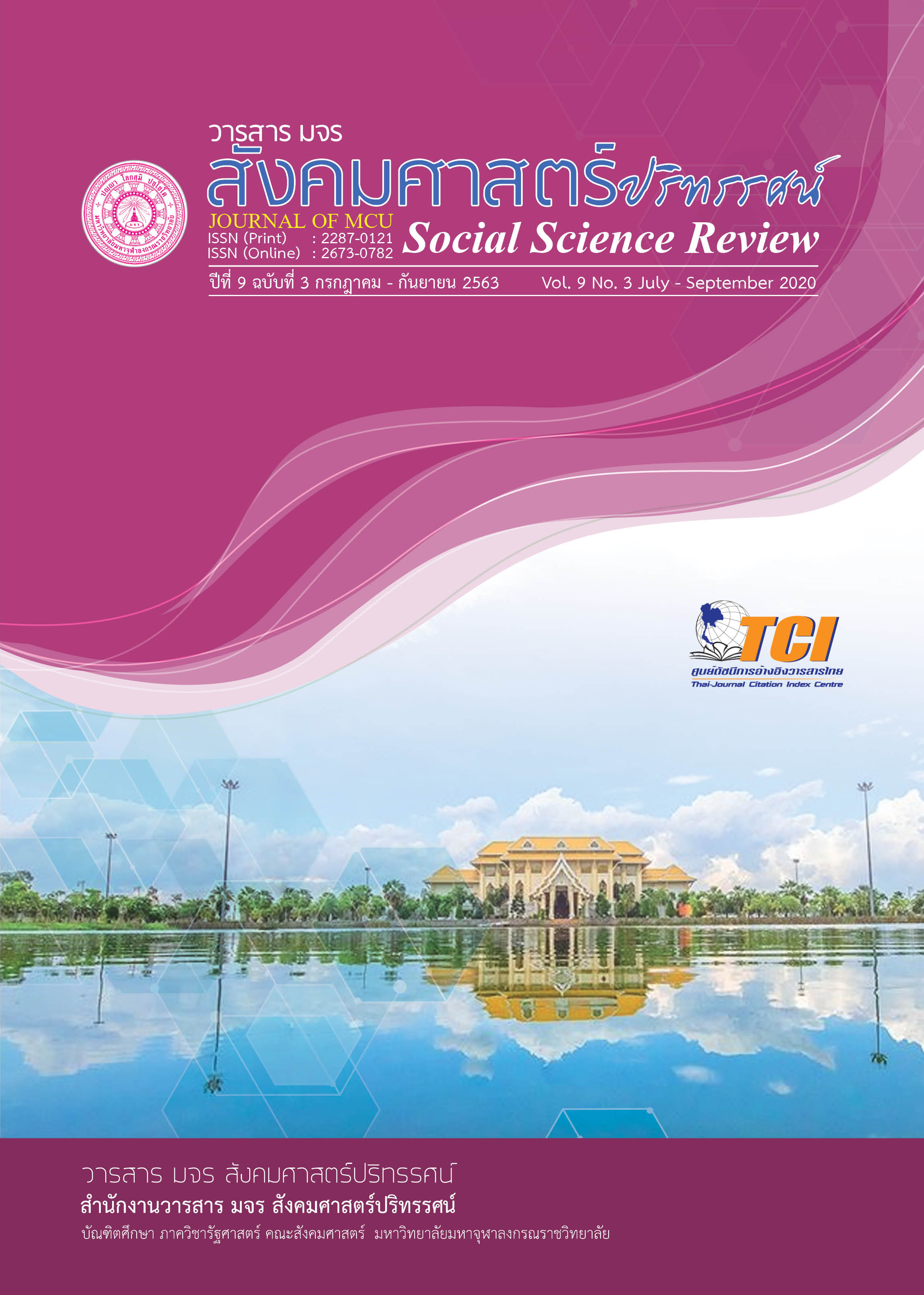แนวทางการพัฒนาโรงเรียนมัธยมศึกษาโดยใช้หลักปรัชญาของเศรษฐกิจพอเพียงขั้นที่ 3 (นวัตกรรมและมูลค่าสูง) เพื่อพัฒนาท้องถิ่นในประเทศไทย
คำสำคัญ:
การพัฒนาโรงเรียน, ปรัชญาเศรษฐกิจพอเพียง, นวัตกรรมและมูลค่าสูงบทคัดย่อ
บทความวิจัยนี้มีวัตถุประสงค์เพื่อศึกษาแนวทางการพัฒนาโรงเรียนมัธยมศึกษาและท้องถิ่นด้วยหลักปรัชญาของเศรษฐกิจพอเพียงขั้นที่ 3 (นวัตกรรมและมูลค่าสูง) ด้วยการวิจัยเชิงคุณภาพเทคนิคเดลฟาย กับ 17 กลุ่มผู้เชี่ยวชาญผู้เรียนหลักสูตร นพย.1 ผลการวิจัยพบว่า 1. แนวทางการสร้างนวัตกรรมในโรงเรียนตามการพัฒนาการเรียนการสอนของโรงเรียนตามหลักปรัชญาเศรษฐกิจพอเพียง ขั้นที่ 3 ประกอบด้วย (1) เงื่อนไขความรู้ พบว่ามี 5 ข้อกิจกรรมที่โรงเรียนที่มีนวัตกรรมจะต้องมีการพัฒนา (2) เงื่อนไขคุณธรรม มี 12 ข้อปฏิบัติตามหลักเงื่อนไขคุณธรรมของโรงเรียนที่มีสินค้าหรือกิจกรรมที่เรียกรับค่าบริการได้ และที่มีนวัตกรรมที่มีมูลค่าสูง (3) ความมีเหตุผล พบ 13 แนวทางหลักในการดำเนินกิจกรรมที่ผู้บริหารและครูใช้ในการสร้างนวัตกรรมสินค้าและบริการของโรงเรียน (4) มีภูมิคุ้มกันที่ดี พบ 15 กิจกรรมที่เป็นแนวทางสร้างภูมิคุ้มกันที่ดีในการดำเนินกิจกรรมให้เกิดการเรียนการสอนที่ดี การมีสินค้าและกิจกรรมที่เรียกรับค่าบริการได้ของโรงเรียน มีความมุ่งหวังให้นักเรียนได้ฝึกคิด ฝึกอาชีพ พัฒนาทักษะทั้งการงานและอาชีพ โดยผ่านตัวการศึกษาและกิจกรรมที่มีนวัตกรรม และ (5) ความพอประมาณ พบ 8 แนวทางการพิจารณาความพอประมาณในการจัดการสินค้าและกิจกรรมนวัตกรรมที่โรงเรียนควรจะมี 2. แนวทางการพัฒนาโรงเรียนมัธยมศึกษาและท้องถิ่นตามแนวทางตามปรัชญาเศรษฐกิจพอเพียง ขั้นที่ 3 พบว่า 1) ลักษณะกิจกรรมอาชีพที่สัมผัสหรือรับรู้ถึงนวัตกรรมสินค้า/กิจกรรมที่เรียกเก็บค่าบริการของโรงเรียนมี 11 ลักษณะ และ 2) พบว่ามี 10 เกณฑ์การประเมินผลประสิทธิผลด้านการดำเนินการนวัตกรรมในโรงเรียน
เอกสารอ้างอิง
กมลรัตน์ เทอร์เนอร์และคณะ. (2559). การลดเวลาเรียนเพิ่มเวลารู้: แนวคิดและการประยุกต์ใช้ในการศึกษาพยาบาล. Nursing Journal of The Ministry of Public Health, 26(3), 13-26.
กล้า ทองขาว. (2558). การจัดการศึกษาแบบยึดพื้นที่เป็นฐาน: แนวคิด แนวทาง และกรณีศึกษา. วารสารราชภัฏสุราษฎร์ธานี, 2(2), 21-36.
คณะกรรมการการศึกษาขั้นพื้นฐาน. (2562). โครงการการขับเคลื่อนหลักปรัชญาเศรษฐกิจพอเพียงสู่สถานศึกษา. บทความสถาบันสังคมศึกษา. สืบค้น 20 ธันวาคม 2562, จาก http://academic.obec.go.th/articledetail.php?id=19.
น้ำผึ้ง มีศิลและคณะ. (2560). กระบวนการในการจัดการศึกษาโดยครอบครัวแบบเสริมสร้างทักษะชีวิตและการทำงานในศตวรรษที่ 21. Veridian E-Journal,Silpakorn University (Humanities, Social Sciences and arts)ฉบับภาษาไทย สาขามนุษยศาสตร์ สังคมศาสตร์ และศิลปะ, 10(1), 208-218.
น้ำผึ้ง มีศิล. (2559). การวิจัยด้วยเทคนิคเดลฟาย: การหลีกเลี่ยงมโนทัศน์ที่ไม่ถูกต้อง. Veridian E-Journal, Silpakorn University, 9(1), 1256-1267.
ประวัติ พื้นผาสุก. (2562). การขับเคลื่อนหลักปรัชญาของเศรษฐกิจพอเพียงสู่สถานศึกษาขั้นพื้นฐานในโรงเรียนบ้านเมืองคองอำเภอเชียงดาว จังหวัดเชียงใหม่. วารสารวิจัยและพัฒนา มหาวิทยาลัยราชภัฏบุรีรัมย์, 14(2), 148-155.
ลลิต ถนอมสิงห์. (2559, 18 สิงหาคม). กรรมการและรองเลขาธิการมูลนิธิชัยพัฒนาฯ รุ่นที่ 1 (นพย.1) [บทสัมภาษณ์].
วัลลภ รัฐฉัตรานนท์. (2562). การวิจัยอนาคตโดยใช้เทคนิคเดลฟาย. วารสารสหวิทยาการวิจัย: ฉบับบัณฑิตศึกษา, 8(1), 1-10.
วีระศักดิ์ จินารัตน์. (2557). การวิเคราะห์ข้อมูลด้วยสถิติเชิงอนุมาน. วารสารวิชาการมหาวิทยาลัยการจัดการและเทคโนโลยีอีสเทิร์น, 11(2), 80–85.
สำนักงาน กปร.. (2559). หนังสือชุดเผยแพร่องค์ความรู้ตามแนวพระราชดำริ เล่มที่ 2 “เศรษฐกิจพอเพียง”. กรุงเทพฯ: สำนักงานคณะกรรมการพิเศษเพื่อประสานงานโครงการอันเนื่องมาจากพระราชดำริ.
สุภางค์ จันทวานิช. (2556). การวิเคราะห์ข้อมูลในการวิจัยเชิงคุณภาพ (พิมพ์ครั้งที่ 11). กรุงเทพฯ: สำนักพิมพ์แห่งจุฬาลงกรณ์มหาวิทยาลัย.
สุเมธ ตันติเวชกุล. (2559). โครงการท่องเที่ยวเชิงอนุรักษ์ในพื้นที่ชัยพัฒนา-กาชาดไทย(บ้านทุ่งรัก), ตำบลคุระบุรี อำเภอคุระบุรี จังหวัดพังงา. สืบค้น 20 มีนาคม 2563, จาก https://www.chaipat.or.th/progress-report/9100-18-2561.html
Jeffrey, S. (2015). Devil of Delphi. Scottsdale. Arizona: Poisoned Pen.
Timothy, M. (2011). Organizational structure effect on communication efficiency for management information system supported organizations: A Delphi study (Doctoral Management in Organizational Leadership with a Specialization in Information Systems and Technology). Arizona: University of Phoenix.
ดาวน์โหลด
เผยแพร่แล้ว
รูปแบบการอ้างอิง
ฉบับ
ประเภทบทความ
สัญญาอนุญาต
ลิขสิทธิ์ (c) 2020 วารสาร มจร สังคมศาสตร์ปริทรรศน์

อนุญาตภายใต้เงื่อนไข Creative Commons Attribution-NonCommercial-NoDerivatives 4.0 International License.
เพื่อให้เป็นไปตามกฎหมายลิขสิทธิ์ ผู้นิพนธ์ทุกท่านต้องลงลายมือชื่อในแบบฟอร์มใบมอบลิขสิทธิ์บทความให้แก่วารสารฯ พร้อมกับบทความต้นฉบับที่ได้แก้ไขครั้งสุดท้าย นอกจากนี้ ผู้นิพนธ์ทุกท่านต้องยืนยันว่าบทความต้นฉบับที่ส่งมาตีพิมพ์นั้น ได้ส่งมาตีพิมพ์เฉพาะในวารสาร มจร สังคมศาสตร์ปริทรรศน์ เพียงแห่งเดียวเท่านั้น หากมีการใช้ภาพหรือตารางหรือเนื้อหาอื่นๆ ของผู้นิพนธ์อื่นที่ปรากฏในสิ่งตีพิมพ์อื่นมาแล้ว ผู้นิพนธ์ต้องขออนุญาตเจ้าของลิขสิทธิ์ก่อน พร้อมทั้งแสดงหนังสือที่ได้รับการยินยอมต่อบรรณาธิการ ก่อนที่บทความจะได้รับการตีพิมพ์ หากไม่เป็นไปตามข้อกำหนดเบื้องต้น ทางวารสารจะถอดบทความของท่านออกโดยไม่มีข้อยกเว้นใดๆ ทั้งสิ้น





